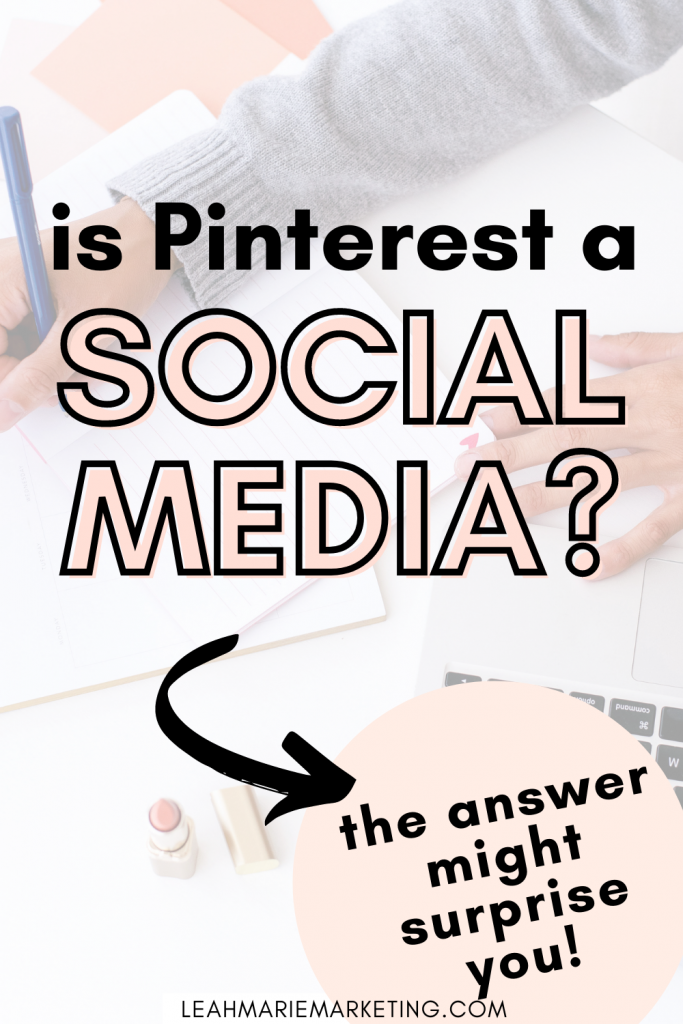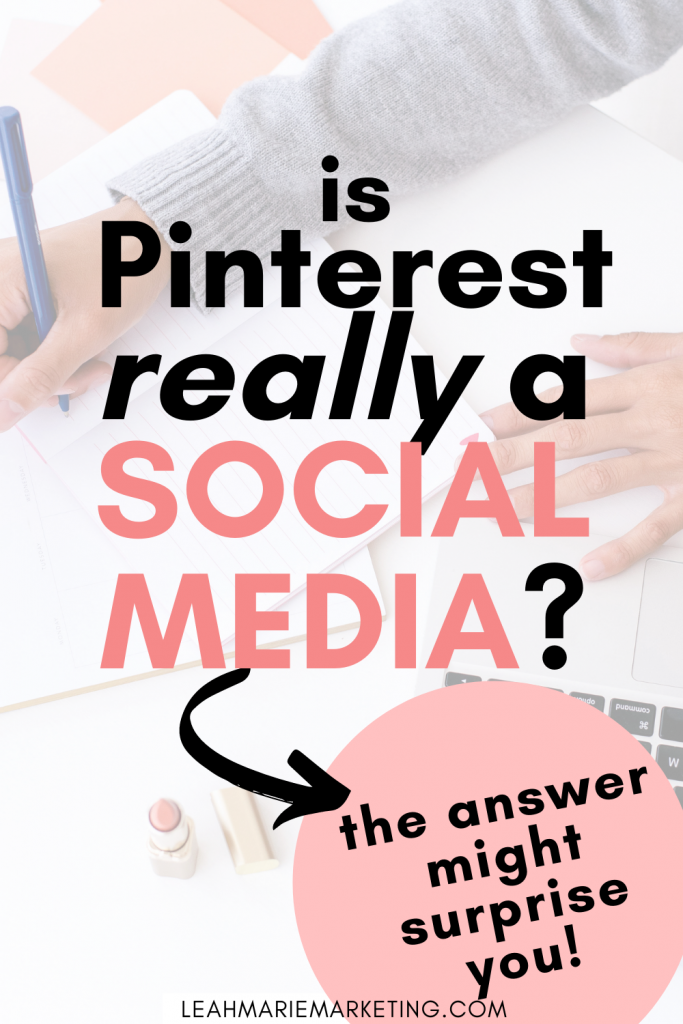
Pinterest is one of the world’s largest digital platforms, and it is used by thousands of marketers, bloggers, merchants, and influencers each month.
With its large popularity, you may have heard Pinterest referred to as a social media.
However, is Pinterest actually a social media platform? The answer might surprise you.
This post will deep dive into the Pinterest platform to uncover whether it is actually a social media, as it is commonly said to be. Plus, find out how you can use this information to improve your Pinterest marketing strategy.
Let’s dive in.
Please note: Pinterest is always changing, and while I try my best to update my posts, not all information may be up to date. If you’re looking too see the most updated tips, strategies, and information, check out this resource page.
What is Pinterest and how does it work?
Pinterest is a visual discovery engine that helps its users, which are called Pinners, find inspiration and ideas.
When a Pinner finds an image or video they like, called a pin, they can save it to a board. A board is a collection of pins that is put together by a Pinner.
Pinners can find pins in multiple different places such as the:
- Home Feed
- Search Results
- Today Tab
- Related Pins
- Watch Tab
Each of these places aims to help Pinners find content that is either most relevant to what they are looking for or content that they are interested in. Pinterest’s complex algorithm helps to rank and distribute pins in a way that Pinners will find most useful.
On Pinterest, content isn’t chronological—it’s personal. Your content shows up right as people are looking for something to try, buy or do.
On Pinterest, Pinners can create and save pins, shop pins, follow other Pinners, visit websites linking to pins, and much more.
Is Pinterest a social media?
Is Pinterest a social media?
Pinterest is certainly very different from traditional social media such as Instagram, Facebook, TikTok, and others.
While some can absolutely argue that Pinterest is a social media, many Pinterest marketers believe that Pinterest is more like a search engine than a social media.
And here’s why:
While Pinterest is certainly not a traditional search engine such as Google, Bing, or Safari, it does contain many elements of a search engine. This is may many people call Pinterest a visual search engine.
Social media is a place to be social, while Pinterest is a place usually used to search and find things.
In the 2021 Pinterest Creator Festival, Pinterest CEO Ben Silberman even said:
“It’s not about dance memes or political debates or living the most fabulous life. It’s more media than social.”
Additionally, on the How Pinterest Works page, Pinterest says:
“People use Pinterest when they want something new, but don’t have a specific idea in mind. It’s like a visual search engine, guiding people to ideas that are just right for them.“
Pinterest places most of its emphasis on finding new ideas and inspiration. Even though a portion of the home feed is dedicated to pins from users that people follow, Pinterest removed its previous “Following” tab, where users would see pins directly from the users they followed, which seems to indicate that Pinterest is not an extremely “social” platform compared to others.
Is Pinterest becoming more social?
While Pinterest definitely seems to be more of a search engine than a social media, I would also say that Pinterest is becoming a bit more social.
Here’s why:
- Pinterest has been focus on providing Pinterest Creators (sort of like the “influencers” of Pinterest) the tools to help them grow an audience.
- Idea Pins are a new pin format that help users to find and follow Pinterest Creators and even shop on the platform. Read 20+ tips to create good-performing Idea Pins here.
- Pinterest recently started a new program Creator Rewards, which “will pay creators based on community engagement” (Source). Find out how to join the program here.
Additionally, users will sometimes get notifications when someone they follow posts an Idea Pin.
It seems as if Pinterest wants Creators to grow connections and trust with their audience to increase shopping and monetization efforts.
While the search intent of Pinterest will likely never go away, Pinterest does seem to be making some changes to make the platform more social, and Pinterest is placing more emphasis on building on audience.
How is Pinterest different from other social media platforms?
As previously mentioned, Pinterest is very different from other popular social media platforms. Here are some of the reasons why:
- Pinterest content is not displayed chronologically. Instead, it is mainly displayed based on relevance to search queries or what the user is interested in.
- Pinners don’t usually engage with one another. Compared to other social media platforms where engaging with others is key, this isn’t as much the case on Pinterest.
- Pinterest is more about finding ideas and inspiration to help them than interacting with other users, similar to the way that search engines are used to find answers to things.
- Pinterest content is evergreen, meaning that it can appear years and years down the road. A pin created 3 years ago could still perform as well now as when it was created. These pins can also rank in search results for years to come. There are less real-time updates on Pinterest.
Sure, some other social media platforms have some of these characteristics, but Pinterest encompasses all of these.
Related: How to Rank On Pinterest (8 Tips)
How do I use Pinterest as a search engine?
If you want to see good results on Pinterest, you need to understand that it is a search engine and use it as a search engine.
How do you do this?
1. Create searchable content (and content that others want to see)
Since search engines are all about providing people with what they want to see, you need to create content that other users want to see!
To find out what Pinners are searching for or interested in, you should do keyword research on Pinterest. (I have an entire Pinterest keyword research guide with over 7 methods here!)
Some ways you can find what is popular on Pinterest are:
- Pinterest keyword bubbles
- Pinterest search
- Pinterest topics sitemap
- Pinterest categories
- Popular pins
- “More like this” feed
- Pinterest ads keyword research tool
- New boards
- Pinterest trends
- Pinterest predicts
This post will outline how to use each of these methods.
While you don’t have do focus on targeting searchable or popular keywords, doing so can certainly help you reach your target audience faster.
I also have a free ebook that will help you to find the best Pinterest keywords for your blog or business, which you can find here!
2. Optimize your pins, boards, and profile for Pinterest SEO
Pinterest SEO (search engine optimization) is the process of optimizing your Pinterest pins, boards, and profile with keywords in order to tell Pinterest exactly what your content is about.
Similar to the way you would optimize articles with keywords to rank in Google search results, Pinterest’s algorithm also looks at keywords in order to tell what your content is about.
When Pinterest knows what your content is about, it can better distribute and rank your pins where they are most relevant.
Optimizing for Pinterest SEO is crucial for ranking in Pinterest search.
My complete Pinterest SEO checklist will show you 20+ places you can optimize your Pinterest pins, boards, and profile in order to hopefully get your content seen more, which you can read here or download below!
PS: Pinterest board SEO is an extremely important part of Pinterest SEO that you don’t want to overlook. Read my full guide on it here!
3. Encourage engagement using call to actions
Like any search engine, positive engagements are a sign that the content is useful to users, which helps your content to continue to be seen.
Call to actions are a great marketing tactic because they encourage users to take action on your content!
For example, you could say “save for later” or “follow for more!”
These positive engagements can certainly help your pins to get seen more.
If you need some inspiration, you can read my list of 20+ great Pinterest call to actions to help!
Conclusion
I hope that this post has helped you to understand why Pinterest is more like a search engine, although it is commonly referred to as a social media.
I’d love to hear your opinions on this, so be sure to leave a comment below!
If you want more valuable Pinterest information so you can skyrocket your success, read more on my blog or join my email list (I provide some of my MOST VALUABLE INFORMATION to my email list!)
I hope to see you around again soon. Thanks for reading!
Leah Marie
SAVE FOR LATER!





